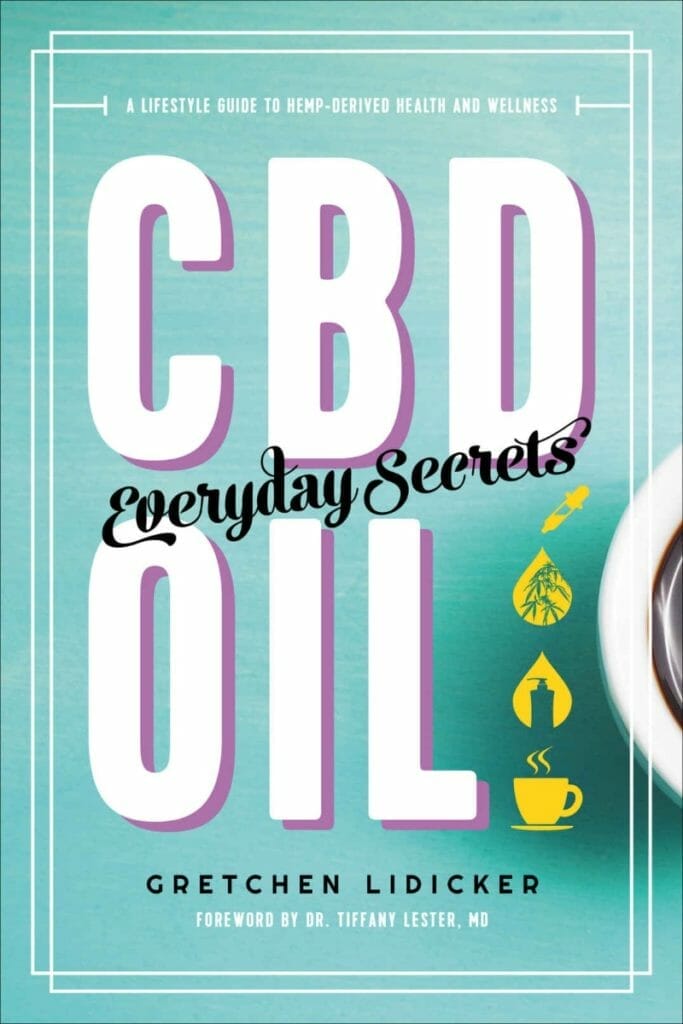There’s no escaping the fact the cannabidiol (CBD) is one of the health revolutions of 2018. It seems that everywhere you currently turn in the health industry, CBD oil is recommended. From pain relief to improving sleep and energy levels, there’s no doubt that, when used correctly, CBD oil is a game-changer for supporting an impressively wide range of conditions. But with this comes a wide range of confusion and also misinformation about its origins, application and issues surrounding legality and usage. That’s where books like “CBD Oil: Everyday Secrets” can really help bust some myths!
There are many books about CBD oil coming onto the market but this one provides the latest science, drawing from leaders in the health and wellness world, coupled with practical information about how to use this product.

So let’s start with the science: This book covers the basics of cannabidiol (CBD) interaction within the body and modulating different pathways in the gut, brain and immune system. There are some interesting short case studies and stories through the chapters to illustrate the application of CBD oil for conditions such as anxiety and chronic inflammation. However, as is so often the case in science, as soon as you publish something it becomes out of date: Cannabis is now classed as a Schedule 2 and not Schedule 1 drug; changed in the UK as part of a ruling over the summer initiated by the Billy Caldwell case.
The American science journalist has written this book primarily for the American market, meaning that there are some differences between the CBD oil products and sourcing in the UK. There is a short discussion midway through this book about Tetrahydrocannabinol (THC). This makes for interesting reading about the different Phytocannabinoids that are found in some strains of cannabis plants, but THC is the psychoactive component of cannabis, which creates unwanted mind-altering side effects and affects the legality of cannabis products in this country. In the UK, legal CBD oil that is sold as a food supplement means the product is derived from Cannabis sativa L. plant that is naturally low in THC, i.e. <0.2%. This means that you get all the health benefits of CBD without the psychoactive side effects of THC and confers legality to the product for the UK market. After all, it’s CBD that is the major health benefiting Phytocannabinoid that modulates the body’s natural endocannabinoid system supporting many different conditions.
The author also discusses different CBD oil extraction techniques and the composition of the final product. From my extensive research, I actually recommend that you use a CBD oil that is raw in nature and therefore undiluted, rather than containing MCT oil or hemp oil. This ensures you have maximum concentration of CBD and other health benefiting Phyto cannabinoids without any dilution effect of inhibition of their absorption. I also recommend looking for CBD products derived from Cannabis sativa L. strains grown in the UK that undergo strict quality control procedures so that you know the stated levels of CBD in each batch for accurate dosing – as comprehensively and usefully covered in Chapter 9. You can obtain these CBD oils from reputable food supplement companies or some health food stores.
Where this book really comes into its own, along with the dosing information, is with the chapter titled “CBD in the Kitchen”, which includes twenty appealing, tasty and easy to make recipes including my favourites – Superfood Chocolate bars and Adaptogenic Hot Chocolate – not the snappiest of drinks titles but a firm winner in our household!
Okay, so once again, being written for an American audience some of the branded optional ingredients like the named CBD oils and greens powders aren’t widely available in the UK but the recipes are incredibly easy to adapt using your favourite raw CBD oil and organic greens powders that are easily sourced here. Dosing of CBD oil is easy if, for example, you’re using 10ml CBD oil containing 500mg CBD – this means that 1 drop contains 5mg so you can adjust the dose according to amount of CBD oil recommended in each recipe. You can also split capsules of your favourite turmeric or ashwagandha food supplements and use the contents for different recipes to save buying separate powders!
Raw CBD oil does have a strong, and some say acquired taste (read “slightly grassy”!). This may add to the flavour of some of the recipes but I found that raw chocolate and tasty greens powders that I used in helped balance the natural CBD oil flavour.
The chapter on “CBD Self Care: Bringing CBD Oil Into Your Routine” also has some very interesting recipes for topical treatments using CBD oil – like the aloe vera skin cream and probiotic skin boosting face mask, as well as making your own simple magnesium and CBD body oils. Who knew CBD oil was so versatile?
So who is this book for? Practitioners and consumers are going to gain a great deal of useful information about this wonder product, especially if they are relatively new to the subject of CBD oil. I like the fact that this author takes a fair approach to laying out the different kinds of research and offering strategies for differentiating between more anecdotal evidence versus scientific clinical trials. Where this book also appeals is the balanced practical information about different forms of CBD, including chewables, oil and vaping, whilst also providing the really useful practical recipes for both topical and oral application of CBD oil.
The layout of this book also makes it an easy read with the basic science and information at the beginning and then the second half of the book containing the recipes laid out in easy to follow format with appealing colour photos to entice you to try them.
If there were any criticism, other than the American-centric advice in some of the CBD sourcing and legal areas, I would say that the book is a little light in the science and providing the latest information about the endocannabinoid system and the biochemical nature of CBD and other Phytocannabinoids within the body. As a scientist myself I am immensely interested in understanding the biochemical nature of nutrients and phytonutrients within the body, especially their interactions within the Central Nervous System, but understand that this can make for dense reading for some! However, because CBD oil is a great passion of mine I have written about this in several Nutrigold blogs that you can access (links below) and want wholly UK relevant information.
So, whilst this is an American focused book there is still plenty of useful information about CBD oil and its uses for the UK market. If you want more information about CBD oil, its uses and applications in the UK then please enjoy the Nutrigold blogs and contact us for further information.
Enjoy this read
Elisabeth
References
- https://www.theguardian.com/society/2018/jul/26/cannabis-based-medicines-get-green-light-as-uk-eases-rules
- Ligresti et al (2016) From Phytocannabinoids to cannabis receptors and the endocannabinoids: Pleiotropic physiological and pathological roles through complex pharmacology. Physiol Rev 96:1593-1659
- Marzo et al (2015) The endocannabinoid system and its modulation by Phytocannabinoids. Neurotherapeutics 12:692-698
- Lu, H-C et al (2016) An introduction to the endogenous cannabinoid system. Biol Psychiatry 79:516-525







